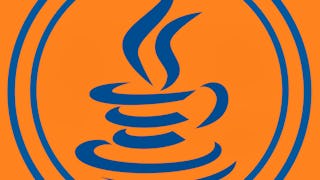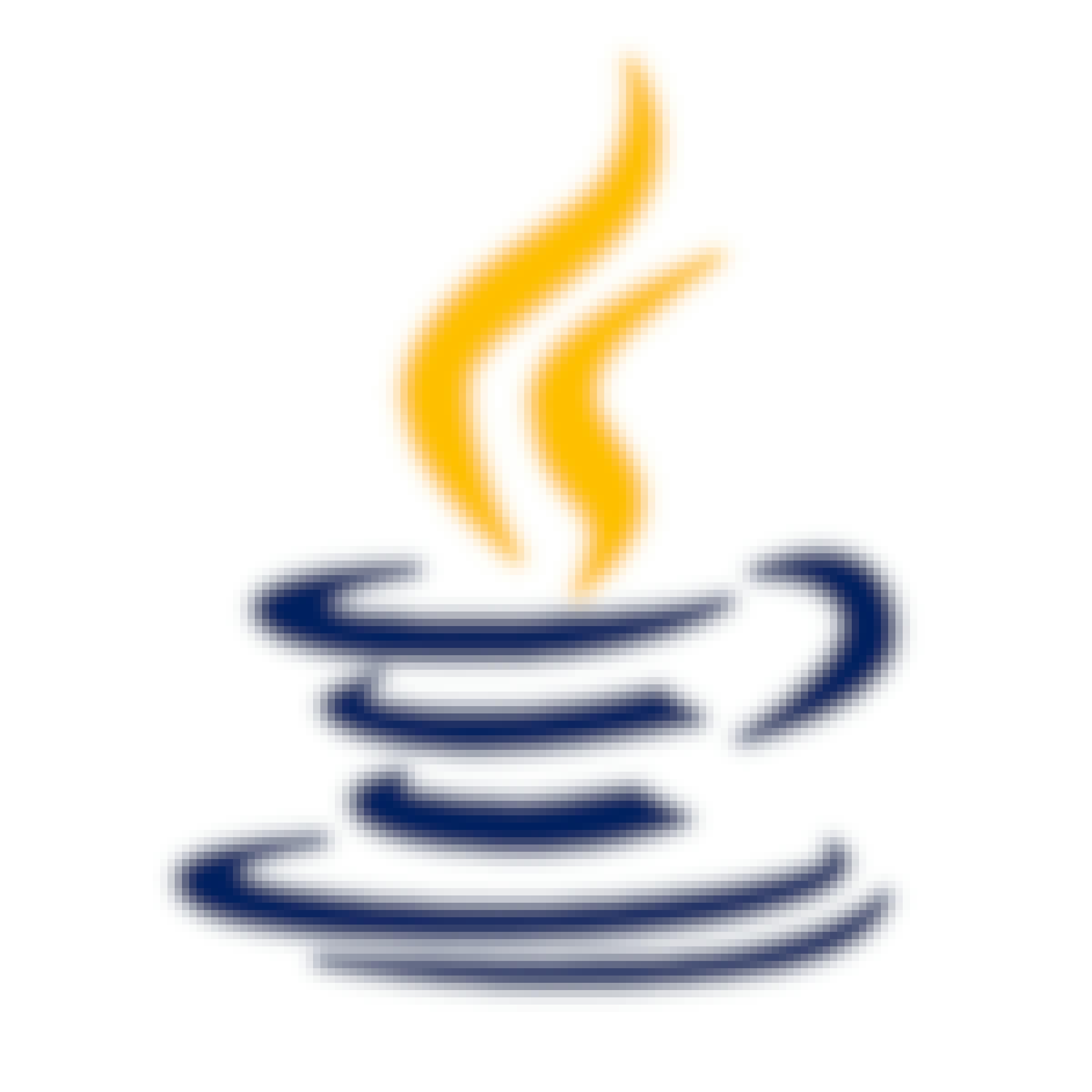- Browse
- Core Java
Core Java Courses
Core Java courses can help you learn object-oriented programming, exception handling, multithreading, and Java Collections. You can build skills in writing efficient algorithms, debugging code, and developing user interfaces. Many courses introduce tools like Eclipse and IntelliJ IDEA, which are commonly used for coding and testing Java applications, along with frameworks such as Spring and Hibernate that facilitate web development and database management.
Popular Core Java Courses and Certifications
 Status: Free TrialFree TrialL
Status: Free TrialFree TrialLLearnQuest
Skills you'll gain: Java Programming, Java, File I/O, Eclipse (Software), Object Oriented Programming (OOP), Object Oriented Design, Integrated Development Environments, Development Environment, Software Design, Computer Programming, Application Frameworks, Programming Principles, Virtual Machines, Web Development, Debugging, Data Persistence, Package and Software Management, Data Structures
4.6·Rating, 4.6 out of 5 stars2.8K reviewsIntermediate · Specialization · 3 - 6 Months
 Status: Free TrialFree TrialC
Status: Free TrialFree TrialCCodio
Skills you'll gain: Apache Maven, JSON, JUnit, Java Programming, Java, Restful API, Integrated Development Environments, Programming Principles, Data Structures, Object Oriented Programming (OOP), Network Protocols, Unit Testing, Style Guides
4.7·Rating, 4.7 out of 5 stars37 reviewsIntermediate · Course · 1 - 4 Weeks
 Status: Free TrialFree TrialL
Status: Free TrialFree TrialLLearnKartS
Skills you'll gain: JUnit, File I/O, Java Programming, Object Oriented Programming (OOP), Java, Unit Testing, Program Development, Maintainability, Software Development, Secure Coding, Software Testing, Programming Principles, Computer Programming, Test Case, Application Development, Authentications, Application Security, Application Design, Debugging, Mathematical Software
4.6·Rating, 4.6 out of 5 stars83 reviewsBeginner · Specialization · 1 - 3 Months
 Status: NewNew
Status: NewNewSkills you'll gain: Database Application, Full-Stack Web Development, Web Applications, Model View Controller, Authentications, Business Logic, SQL
Beginner · Course · 1 - 4 Weeks
 Status: Free TrialFree TrialL
Status: Free TrialFree TrialLLearnKartS
Skills you'll gain: Java Programming, Object Oriented Programming (OOP), Java, Programming Principles, Computer Programming, Application Development, Program Development, Software Design Patterns, Debugging, Unit Testing
4.4·Rating, 4.4 out of 5 stars35 reviewsBeginner · Course · 1 - 4 Weeks
 Status: Free TrialFree TrialStatus: AI skillsAI skills
Status: Free TrialFree TrialStatus: AI skillsAI skillsSkills you'll gain: Prompt Engineering, Large Language Modeling, Software Development Life Cycle, Cloud-Native Computing, Software Architecture, Hibernate (Java), Responsible AI, Database Design, Responsive Web Design, Docker (Software), Git (Version Control System), Object Oriented Programming (OOP), CI/CD, Restful API, Java Programming, Model Deployment, Engineering Software, Version Control, Database Management, Software Design
4.6·Rating, 4.6 out of 5 stars7.3K reviewsBeginner · Professional Certificate · 3 - 6 Months
What brings you to Coursera today?
 Status: NewNewStatus: Free TrialFree Trial
Status: NewNewStatus: Free TrialFree TrialSkills you'll gain: Object Oriented Programming (OOP), File I/O, Data Persistence, Object Oriented Design, Java, Java Programming, File Management, Application Development, Maintainability, Software Design, Programming Principles, Development Environment, Program Development, Computer Programming, Data Structures, Data Management, Integrated Development Environments, Debugging, Data Validation
4.7·Rating, 4.7 out of 5 stars184 reviewsBeginner · Specialization · 3 - 6 Months
 Status: Free TrialFree TrialL
Status: Free TrialFree TrialLLearnKartS
Skills you'll gain: Java Programming, Java, Object Oriented Programming (OOP), Mathematical Software, Performance Tuning
4.8·Rating, 4.8 out of 5 stars13 reviewsIntermediate · Course · 1 - 4 Weeks
 Status: Free TrialFree TrialL
Status: Free TrialFree TrialLLearnKartS
Skills you'll gain: Java Programming, Application Design
4.7·Rating, 4.7 out of 5 stars33 reviewsIntermediate · Course · 1 - 4 Weeks
 Status: Free TrialFree TrialB
Status: Free TrialFree TrialBBoard Infinity
Skills you'll gain: Angular, HTML and CSS, Data Structures, Spring Boot, Eclipse (Software), Restful API, Java Programming, Object Oriented Programming (OOP), Model View Controller, Java, Front-End Web Development, Spring Framework, Object Oriented Design, Integrated Development Environments, Javascript, Software Design Patterns, Web Components, Development Environment, Web Applications, Cascading Style Sheets (CSS)
4.4·Rating, 4.4 out of 5 stars841 reviewsIntermediate · Specialization · 1 - 3 Months
 Status: Free TrialFree TrialL
Status: Free TrialFree TrialLLearnQuest
Skills you'll gain: Eclipse (Software), Java, Java Programming, Integrated Development Environments, Development Environment, Computer Programming, Programming Principles, Object Oriented Programming (OOP), Debugging
4.6·Rating, 4.6 out of 5 stars2.2K reviewsBeginner · Course · 1 - 4 Weeks
 Status: Free TrialFree TrialD
Status: Free TrialFree TrialDDuke University
Skills you'll gain: File I/O, Java Programming, Software Design, Debugging, Software Engineering, Javascript, Computer Programming, Event-Driven Programming, Encryption, Algorithms, Image Analysis, AI Personalization, Program Development, Data Processing, Statistical Analysis, Data Import/Export, Predictive Modeling, Integrated Development Environments, Data Analysis, Cascading Style Sheets (CSS)
4.6·Rating, 4.6 out of 5 stars22K reviewsBeginner · Specialization · 3 - 6 Months
In summary, here are 10 of our most popular core java courses
- Core Java: LearnQuest
- Core Java: Codio
- Core Java for Beginners: LearnKartS
- Build a Role-Based Java Web Application: EDUCBA
- Core Java - Foundations: LearnKartS
- IBM Java Developer: IBM
- Java Programming Fundamentals: IBM
- Core Java - Multithreading and Classes: LearnKartS
- Core Java - Design Patterns: LearnKartS
- Java FullStack Developer: Board Infinity
Frequently Asked Questions about Core Java
Core Java refers to the foundational aspects of the Java programming language, encompassing its core libraries and basic syntax. It is essential because it serves as the backbone for developing Java applications, enabling programmers to build robust, scalable, and high-performance software. Understanding Core Java is crucial for anyone looking to pursue a career in software development, as it lays the groundwork for more advanced Java concepts and frameworks.
With skills in Core Java, you can explore various job opportunities, including Java Developer, Software Engineer, Backend Developer, and Application Developer. Many companies seek professionals who can create and maintain Java applications, making Core Java expertise highly valuable in the tech industry. Additionally, roles in data science and artificial intelligence increasingly require a solid understanding of Java.
To learn Core Java effectively, you should focus on several key skills: understanding Java syntax and structure, object-oriented programming principles, exception handling, data types, and collections. Familiarity with Java development tools, such as Integrated Development Environments (IDEs), and version control systems like Git will also enhance your learning experience and prepare you for real-world applications.
Some of the best online courses for Core Java include the Core Java Specialization and the Core Java for Complete Beginners Specialization. These courses provide structured learning paths, covering essential topics and practical applications to help you build a solid foundation in Core Java.
Yes. You can start learning core java on Coursera for free in two ways:
- Preview the first module of many core java courses at no cost. This includes video lessons, readings, graded assignments, and Coursera Coach (where available).
- Start a 7-day free trial for Specializations or Coursera Plus. This gives you full access to all course content across eligible programs within the timeframe of your trial.
If you want to keep learning, earn a certificate in core java, or unlock full course access after the preview or trial, you can upgrade or apply for financial aid.
To learn Core Java, start by selecting a structured course that fits your learning style. Engage with interactive coding exercises, participate in discussions, and practice coding regularly. Utilize online resources, such as forums and documentation, to deepen your understanding. Setting small, achievable goals can also help you track your progress and stay motivated.
Core Java courses typically cover a range of topics, including Java syntax, object-oriented programming, data structures, exception handling, and multithreading. Advanced courses may explore design patterns, performance optimization, and Java frameworks. This comprehensive curriculum ensures that learners gain both theoretical knowledge and practical skills.
For training and upskilling employees, courses like the IBM Java Developer Professional Certificate are highly beneficial. These programs are designed to equip learners with the necessary skills to excel in Java development, making them ideal for workforce development initiatives.










